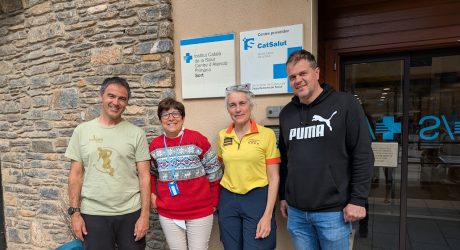Online calculator predicts lung damage at hospital discharge for critically ill COVID patients
This clinical tool, CIBERESUCICOVID SCORE, will select patients who may be more likely to have complications for respiratory follow-up in post-COVID units
The aim of two studies belonging to the CIBERESUCICOVID study led by Jessica González, a researcher at the CIBER de Enfermedades Respiratorias (CIBERES) at the Instituto de Investigación Biomédica de Lleida (IRBLleida), one of the 34 Health Research Institutes (IIS) accredited by the Instituto de Salud Carlos III (ISCIII), was to study the predictive factors of respiratory sequelae in critically ill COVID-19 patients and design a tool for their clinical use.
They determined the most common respiratory sequelae in patients with respiratory distress syndrome and developed a predictive tool called CIBERESUCICOVID SCORE, which has an online calculator that facilitates clinical practice. Data from the large multicentre CIBERESUCICOVID study, funded by the ISCIII and involving more than 50 Intensive Care Units from all over Spain, were used for this purpose.
In the first study, published in the Archives of Bronchopneumology, researchers have determined that the most characteristic respiratory sequelae of patients who have suffered from adult respiratory distress syndrome (ARDS) is the decrease in carbon monoxide capacity (DLCO), which results in a reduced exchange of oxygen from the ambient air into the bloodstream and consequent shortness of breath, especially associated with physical exercise; an alteration that is maintained even one year after hospital discharge.
In this case, 1,327 patients were followed up between three and four months after hospital discharge and predictive factors for moderate to severe DLCO impairment were studied. As explained by CIBERES researcher at IRBLleida and specialist physician at the Pneumology Department of the Hospital Universitari Arnau de Vilanova in Lleida Jessica González, “we found that factors that represent the vulnerability of the patient, such as age and chronic lung disease, and factors that mark the severity of the infection in the acute phase, such as kidney damage and the duration of invasive mechanical ventilation (IMV) are those that determine a higher risk of presenting an altered DLCO after discharge”.
Analysis of cases requiring invasive mechanical ventilation
Based on these results and considering the importance of the impact of IMV on respiratory sequelae, we wanted to investigate which IMV parameters or variables were involved in this moderate to severe decrease in DLCO after hospital discharge, data that were published in the leading intensive care journal, Intensive Care Medicine.
This time, only patients requiring invasive mechanical ventilation from the CIBERESUCICOVID study were analysed. A total of 861 patients were evaluated and a deleterious effect on DLCO of age, intubation delay and duration of intubation, as well as ventilatory parameters such as driving pressure was observed.
In addition, a beneficial effect on DLCO was observed for the use of prone position and lung recruitment manoeuvres during intubation. With all these variables, a nomogram with predictive ability of DLCO during follow-up was constructed and labelled as the CIBERESUCICOVID SCORE. To facilitate use in routine clinical practice, an online calculator was also developed (https://trrm.shinyapps.io/CIBERESUCIscore/).
As Ferrán Barbé, head of the CIBERES group at IRBLLeida, points out, “these findings are very important for efficient follow-up of these critically ill patients, as it is the first time that we have a clinical tool (CIBERESUCICOVID SCORE) that predicts lung damage at hospital discharge and that selects patients with a higher probability of lung damage who should be followed up in post-COVID respiratory units”.
Articles:
- Key Factors Associated With Pulmonary Sequelae in the Follow-Up of Critically Ill COVID-19 Patients: Jessica González, Jordi de Batlle, Iván D. Benítez, Gerard Torres, Sally Santisteve, Adriano D.S. Targa, et al, on behalf of the CIBERESUCICOVID Project. DOI: 10.1016/j.arbres.2022.12.017
- Driving pressure and adjunctive therapies in pulmonary sequelae of Covid-19 patients under invasive ventilation: Jessica González, Iván D. Benítez, Anna Motos, Antoni Torres, Ferran Barbé, on behalf of the CIBERESUCICOVID Group. DOI :10.1007/s00134-022-06951-3
About the COVID ISCIII Fund
The CIBERESUCICOVID study is possible thanks to the aid that the CIBER received from the COVID-19 Fund and which was granted by the Carlos III Health Institute (ISCIII) to support research projects that will improve the clinical approach of COVID-19. These grants are aimed at promoting proposals “that allow immediate implementation and start-up in the National Health System, with concrete, early results applicable to the current emergency situation generated by the impact of this pandemic”, as stated in the ISCIII call for proposals (https://www.ciberes.org/sala-de-prensa/ciberesucicovid)




